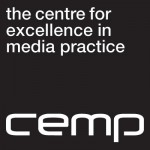
Here is the updated CEMP bulletin for December 2013.
Please contact Julian McDougall to follow up any of these opportunities or to share other ideas for pedagogy/ practitioner research.
Latest research and knowledge exchange news at Bournemouth University

Here is the updated CEMP bulletin for December 2013.
Please contact Julian McDougall to follow up any of these opportunities or to share other ideas for pedagogy/ practitioner research.
Exposure to guest lectures and research seminars by expert speakers is a key aspect of learning on the HSC BA Sociology & Social Policy programme. A diverse group of our level I students undertaking the unit ‘History of Social Welfare’ were very privileged to be able to witness a session led by Professor Otto Hutter, former Regius Professor of Physiology at the University of Glasgow and Mrs Josephine Jackson on the Kindertransport Movement. This ran between 1938 and 1940, halting from Germany to Britain at the outbreak of war in 1939. The final Transport ship carrying the children set sail from Holland to Britain in May 1940 following which the Dutch army was forced to surrender to the Third Reich.
Mrs Jackson, who is a regular public speaker on the Holocaust and especially the Kindertransport, provided the context for the session by informing the audience of how Stanley Baldwin, the former Prime Minister, had made an impassioned appeal on radio for public aid on the 8th Dec 1938, in the wake of the infamous Kristallnacht pogrom that had just taken place a month earlier in Germany. Over £522,000 was raised in answer to the call from the concerned, ecumenical British public.
Urged on by involved individuals and welfare organisations, Neville Chamberlain’s Government agreed to allow an unspecified number of unaccompanied refugee children into the country under private sponsorship of £50 per child (about 1/10 the price of an average house!), and through the ministration of 175 committees, until such time came when they could be rejoined with their families in Europe. For the greatest majority such a moment never came as their families perished; but in the meantime as their parents had intended, the children survived and many flourished under the patronage of this country.
The students were profoundly moved to hear the personal account offered by 89-year-old Professor Hutter, who, as 14-year-old boy, was one of the first children to arrive in Britain on the Kindertransport. He was eventually taken under the wing of his sponsors, Mr and Mrs Blacksill and their three children, and soon after excelled at the public school, Bishop’s Stortford College, as public schools also rose to the challenge of taking in refugee children on a scholarship basis.
The most moving verbatim extract taken from this very modest and venerable, aged academic, is taken from his account recollecting the last time he would ever see his ex-army officer father as Otto departed Vienna for good: ‘To me as a heedless youngster, it was all a great adventure. I was anxious to go. The thought I would never see my parents again, never crossed my mind. My father who saw the future more clearly, held me back to bestow his blessing. When I bless my children, grandchildren, my great-grandchildren, as is the Jewish custom, I still think of his blessing.’
In this present anti-Europe, anti-immigration political climate, inflamed by similar austerity measures to 1930s Europe, it is important to remind ourselves of some of the key lessons that the Kindertransport Movement initiative provided. Firstly, that it was Britain alone, of those countries fighting in the Second World War that remained unoccupied in Europe, and rose with remarkable swiftness to rescue refugee children en masse and thus secured their safety from Nazi oppression (where one should add that Dorset played no small part in that mission). That while 10,000 refugee children were rescued before this vital escape route was closed by war, 90% (1.5m) of Jewish European children would ultimately perish in the Holocaust. In this day of anti-immigration xenophobia, it is also very important to remember what gifts and talents these refugees would bring to their host country. The fact that the Kindertransport Movement brought two future Nobel prize winners to Britain, is merely a symbol of the less celebrated but greatly valued achievements of other refugees that were welcomed here.
Bournemouth University contributed to the successful Cost Action Training School 2013 earlier this month (see: www.um.edu.mt/events/costactiontraining2013/). The Training School ‘Writing for maternity services research, theory, policy and practice: Integrating new theoretical insights from the iR4B COST Action’ was held at the University of Malta.
The 24 trainees who were successful in their application came from a wide-range of European countries. At the Training School each trainee was linked to one of six experienced trainers, three from Ireland: Prof. Declan Devane, Dr. Valerie Smith, and Prof Cecily Begley, and three from the UK: Prof. Soo Downe, Dr. Lucy Firth, and BU Prof. Edwin van Teijlingen. These trainers brought to the Training School not only their extensive experience as writers, but also that of scientific editors, reviewers for academic journals, and PhD supervisors.
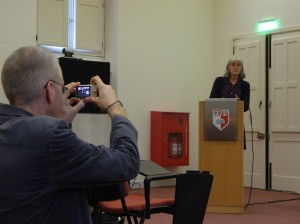
(photo by Mário Santos, Portugal).
The Training School included presentations on how to incorporate notions of salutogenesis and complexity into maternity care and midwifery publications, issues around writing academic English as a non-native English speaker, plagiarism, how to start writing an academic paper for a MSc or PhD thesis, and many more related topics.
In their feedback some trainees stressed that this is the kind of helpful information every postgraduate student and budding academic should know about. Others said “I wish I had known that before as no one ever addresses these issues.” The trainees discussed the outlines of their papers, and they were given ample time to draft papers under the watchful eye of their trainer. All trainees have committed to submit a paper derived from the Training School by early Spring 2014.
COST (European Cooperation in Science and Technology) is one of the longest-running European frameworks supporting cooperation among scientists and researchers across Europe. For further information on OST in general see: http://www.cost.eu/ ).
Bournemouth University was represented by Prof. Edwin van Teijlingen based at the Centre for Midwifery, Maternal & Perinatal Health in the School of Health & Social Care. 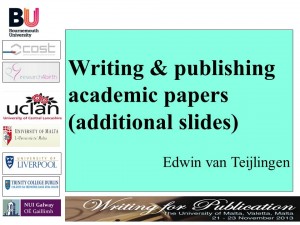
As part of the Fusion Investment Fund, we (Prof Jonathan Parker & Dr Sara Ashencaen Crabtree) won a study leave grant throughout the current academic year.
Our project aims to create sustainable research and education opportunities across BU through the establishment of a social science research, education and professional practice network with Southeast Asian and Asian universities. An aim which also enhances and builds on our personal research agendas that will lead to the development of robust Research Council funding applications, and contribute to fusion and the BU 2018 vision.
The project will identify, scope and establish a sustainable social science research academic network across BU. This aim has been initiated through discussion with some key individuals in BU and the potential to develop, in 2014-15, research council bids in respect of:
a. gender relations and practices in the professions
b. understanding the ways in which conflict resolution is culturally specific and that learning can enhance our opportunities for establishing social cohesion and a reduction of conflict
c. examination of the neo-imperialism of research ethics scrutiny from Western perspectives
d. it may also lead to work in respect of sustainability in the lives of indigenous peoples.
The core part of the study leave will develop and conduct research and research collaboration in Southeast Asia, predominantly Malaysia but including Cambodia, and Hong Kong. As part of our study leave we have both been awarded visiting Professor status at Universiti Kebangsaan Malaysia (UKM) in Kuala Lumpur where we will spend January until April 2014, followed by visiting professorships at Universiti Sains Malaysia (USM) in Penang from April until July. We will also be visiting universities in Hong Kong, Cambodia and Universiti Malaysia Sarawak (UNIMAS) in Kuching, East Malaysia.
Four core fusion and BU 2018 objectives underpin our project. These will result in funded research bids, increased student experience, and reputational enhancement for BU, and will be achieved through four workstreams:
Research:
1. establish a sustainable research network promoting social sciences and interdisciplinary research at BU (workstream 1).
2. develop research streams of locally specific or cross-cultural relevance (workstream 2).
Education:
3. engage and promote educational initiatives via guest lectures/research seminars, developing joint postgraduate research supervision and educational initiatives promoting student mobility, e.g. credit transfer (workstream 3).
Professional Practice:
4. engage in discipline-specific activities in relation to social work/development and welfare (workstream 4).
We have been invited to join the Tasik Chini Research Centre at UKM, a centre dedicated to research concerning the ravaged freshwater lake near Kuala Lumpur. As part of our research we will be undertaking an ethnography and conflict resolution narrative work with the Jakun tribe of the Orang Asli (the indigenous people of the region) with a view to promoting the marginalised voices of these people, disenfranchised by modernising agendas. We will also be researching approaches to unfair and wrongful discrimination in social welfare practices in the UK and Malaysia.
We look forward to keeping BU colleagues up-to-date with our work in Southeast Asia through our blogs. For those interested in developing research across these areas please contact us as we wish to ensure that social science research is highlighted across BU.
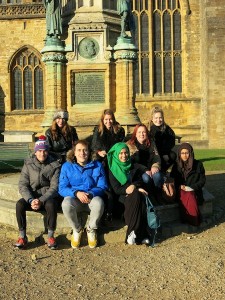 On a recent fieldtrip to Sherborne, our Sociology and Social Policy students, taking the ‘History of Social Welfare’ unit, explored the interconnections of past and present social movements and social policies. The mechanisms for the alleviation of poverty and disadvantage in Britain are reflected by Sherborne’s history, which represents a microcosm of historical trends.
On a recent fieldtrip to Sherborne, our Sociology and Social Policy students, taking the ‘History of Social Welfare’ unit, explored the interconnections of past and present social movements and social policies. The mechanisms for the alleviation of poverty and disadvantage in Britain are reflected by Sherborne’s history, which represents a microcosm of historical trends.
Students and staff visited the almshouses (now St. Johns’ House), which is no past relic but instead has offered a remarkable six hundred years of unbroken community service, being set up in 1437 and continuing without interruption to the present time. St Johns’ Almhouse built on earlier charitable provision by the monks and we heard of its violent beginnings, of when townsfolk rioted and burned significant parts of the monastery church before gaining a voice in provision for the town’s poor folk. Students learned how the distinctions of ‘deserving’ and ‘undeserving’ were applied then in similar ways to today, as a means of separating and distinguishing people and maintaining a particular social order.
Bringing their learning of social welfare in this case study town to the present day, we gained insight from the Rev Dr Ray Catchpole of how difficult it was in our current times of austerity to convince the people of Sherborne that people were again experiencing poverty even to the point of near starvation. He described the food bank that he now runs that has grown over six months to deliver over 200 food parcels each month.
Students reflected that the fieldtrip gave vibrancy to the classroom learning and demonstrated some of the pervading interconnections in British social policy thinking – the distinction between deserving and undeserving poor, the power relations between capital and the disenfranchised and the continuing political and moral struggles concerning how, as a society, we deal equitably and fairly with people in poverty and how we challenge normative thinking and tackle the disadvantages caused by prevailing social structures. Using the words of Sir Walter Raleigh, former resident of Sherborne and campaigner on behalf of a mistreated pauper, those with responsibility and power ‘should be protecters and not oppressers off poor pepill.’
Prof Jonathan Parker & Dr Sara Ashencaen Crabtree
On Monday many of you will have seen Rebecca Edwards’ blog post giving more information about the new research website. It explains why BU is developing it, when the site will be live, how it will work and addresses some frequently asked questions that have cropped up in discussions.
If you missed this post you can view it here.
The new website will have a host of additional features, making it easier for you to update and add your own content. It provides a considerably improved platform for integrating a wider variety of content, such as image galleries and videos.
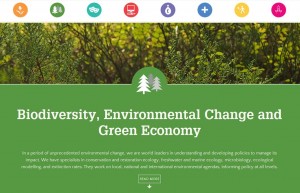 Training sessions are taking place over the next two months. You can book a session online or contact Rebecca Edwards for more information.
Training sessions are taking place over the next two months. You can book a session online or contact Rebecca Edwards for more information.
Using the website is surprisingly easy and in the sessions you’ll learn how to upload, edit and tag content. Rather than carrying out training sessions with ‘dummy’ test material, we would like to use the time for you to upload relevant content to your research theme.
We’d be grateful if you could please have something available that you can upload during the training session. Examples could include:
– New or recent images
– Videos
– Details of a new research project
– Details of successful grant applications
– A profile of a post graduate researcher
– Information about planned or recent public engagement activity
Rebecca Edwards or I will be happy to answer any questions in the meantime, so do get in touch. We look forward to seeing you at one of the training sessions.
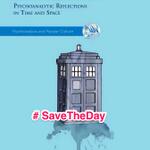
The Doctor, his TARDIS-driven adventures, along with companions and iconic monsters, are all over the TV and newspapers. The Inner World of Doctor Who is a new book, just out. Written by Prof Mike Rustin (UEL, Tavsitock Clinic) and Prof. Iain MacRury in the Media School here at BU. This publication offers an accessible account of Doctor Who. It focusses just on the most recent television output – 2005 to 2013 – and examines why the show continues to fascinate us.
The Doctor’s relationships with his companions are to the fore. Various chapters also consider the dramatic meanings of monsters and time travel – linking the show back to ideas about audience experience – and what we might ‘learn’ from Doctor Who. It looks at the complexity of the new Doctor Who in its depictions of the suffering of the Doctor, as well that of his at times vulnerable and dependent companions. A connection is made between TV content and some (but not all) elements in the experience of psychotherapy.
We propose that one way of thinking about the Doctor is to see him as a kind of inadvertent ‘therapist’ – with the TV dramas on screen rendering troubled states of mind and society within a rich cultural frame. Doctor Who extends a fairy-tale and children’s fictional tradition across its contemporary media platforms. As we argue: In Doctor Who everyday life is often revealed to be “Bigger on the inside.”
The 50th anniversary won’t come again and it provided a chastening deadline we’re glad to have met it! The book was inspired by the startling success of the show in recent years. Why does it attract such attention and affection? While thinking about it I got further daily encouragement from the TARDIS that sits on the ground floor of Weymouth House, courtesy of our former Media School colleague, Dr Andrew Ireland.
The Inner World of Doctor Who is published with Karnac books. It should be of interest to diehard fans. But it is written, too, for people who probably wouldn’t claim the title ‘fan’ but for whom all the fuss about Time Lords and Tardises just now (The Doctor is even on postage stamps!) is provoking the thought: “What’s this all about!?” The Inner World of Doctor Who offers some answers.
– Written with a colleague, Prof. Mike Rustin, from UEL and the Tavistock and Portman NHS Trust the book emerges from an enriching collaboration that began in some teaching sessions at the Tavistock clinic on their MA in Psychoanalytic Studies. It has now developed into this book. The book came together quite quickly and has been usefully supported by an AHRC funded network called “Media and the Inner World”. The book is published as part of their new series with Karnac called Psychoanalysis and Popular Culture.
If you are interested the book can be found at http://www.karnacbooks.com/Product.asp?PID=34857 or as an e-book: http://www.amazon.co.uk/Inner-World-Doctor-Psychoanalytic-Psychoanalysis/dp/1782200835
British social services, without doubt, represent one of the best systems of social work throughout the world for protecting children, supporting families where circumstances and experience make them vulnerable and ensuring people with mental health problems are appropriately sustained. That notwithstanding, social work services in Britain, and in England in particular, have journeyed towards a more individualistic model of care and treatment promoted primarily in the US, and the roots of community action and practice that are truly ‘social’ have become less visible. This places our social work services, excellent as they are in key areas, on the margins of international understandings of social work.
Perhaps the changes articulated above are understandable given our affaire de Coeur with neoliberal philosophies and our celebration of the cult of the individual derived from Margaret Thatcher’s governments, perpetuated by Tony Blair and continued aggressively by the Coalition government of the day.
These changes have significant impact on people and their communities, reassigning blame from social structure to the individuals themselves. Also, there remains a potentially negative impact on social work globally. Many countries have followed the US and British social work models to develop services, sometimes as a direct result of colonialism, sometimes because of implicit global power relations. There is a legitimate concern that adoption of an individualistic approach reflects a neo-imperialist agenda, with problems resulting for those communities and groups made invisible within this process.
Our new book Professional Social Work (edited by Jonathan Parker BU & Mark Doel Sheffield Hallam) seeks to address some of these challenges. We suggest there is such a thing as ‘professional’ social work, that it must be distinct from ‘unprofessional’ social work. Our thesis is that it is imperative that we reclaim social work and its former radicalism and iconoclastically confront governmental established priorities, emphasising humanity’s social condition rather than its atomisation. In the book, we grapple with the fraught and complex definitions, practices and understandings of ‘professionalism’, exploring how the concept can be used to justify differing perspectives.
Including the work of some of the foremost thinkers in contemporary British social work (Stephen Cowden & Gurnam Singh, Pat Higham, Graham Ixer, Ray Jones, Malcolm Payne, Gillian Ruch, Steven Shardlow, Roger Smith, Neil Thompson, Sue Whist, and Marion Bogo from Canada) we promote professional social work practices that are relational, critical and reflexive, that challenge and help people and their communities to reconstruct themselves in their chosen ways.
Social Work in Palestine, 2nd conference Palestine-UK Social Work Network
The 2nd National Conference of the Palestine-UK Social Work Network, supported by members of the British Association of Social Work, was held on the 12th November at the Amnesty International Centre off dingy Shoreditch High Street, and was an absolute bargain. For a registration fee of only £15.00 it offered a programme of rare value and threw in a two-course vegetarian lunch as well. It was also one of the most compelling and powerful conferences that I’ve ever had the privilege of attending. One heard with almost disbelief and certainly intense disquiet several level-headed presentations reporting the daily and systematic oppression of the Palestinian people, and the fragmentation of any semblance to normality through the enforced occupation of the territories that has continued for over sixty years.
To try to convey what this means, Prof. Manuel Hassassian, Palestinian Ambassador claims that every single Palestinian living under occupation suffers from post-traumatic stress disorder. We also learned what ‘peace’ has meant for these people over the last twenty years since the Oslo Agreement 1993: 7,000 Palestinians killed, twelve thousand+ Palestinian homes destroyed, a further 250,000+ Israeli settlers in Palestinian territories, and finally, 441 miles of apartheid walls built to corral people into armed, patrolled ghettoes.
Jerusalem, historical home of so many Palestinians, is subject to what Issa Rabadi, Officer of the Palestinian Union of Social Workers & Psychologists, described as an ‘undeclared war of ethnic cleansing’, where apparently the goal of the occupational authorities is that the Palestinian population should not exceed 15-20% by the Year 2020. To this end, one third of Palestinian homes in Jerusalem are at risk of being demolished on the official grounds that these are illegal lodgings, with a predicted peak of destruction of homes due in 2014. Yet, apparently gaining legal rights to live in Jerusalem for resident Palestinians is so complex and protracted a process (lasting decades in many cases) that ‘Kafkaesque’ hardly begins to describe it.
The most distressing stories, unsurprisingly, referred to the detainment and torture of Palestinians; particularly those accounts concerning Palestinian children. Many of these child prisoners are as young as 12- or 13-years-old, and are arrested normally on the charge of throwing stones at the occupying forces. This was exemplified by the experiences of speaker, Mohammed Abu al Reesh, who was arrested on two separate occasions in his recent boyhood and subjected on both occasions to brutal physical maltreatment and psychological intimidation throughout this time. Mohammed’s story was by no means exceptional, rather than the reverse. In addition to physical abuse children may also be placed in solitary confinement for up to a month where the only contact is their interrogator. Arrested and imprisoned children are not normally permitted to see their families and even accessing legal support is achieved only with great difficulty. In the case of Mohammed, within a fortnight of being released from his last sentence, he enrolled at university, eventually gaining a BA in media studies with the ambition, now achieved, of becoming a journalist in order to better inform the world of human rights violations taking place in the territories.
So where does social work feature in this catalogue of utter wretchedness? The Global Agenda for Social Work, which seeks to unite social work educators and practitioners universally in the promotion of this year’s theme ‘Promoting social and economic inequalities’, directly resonates with the UN Millennium Development Goals.
Palestinian social workers live and work under the same high levels of daily oppression and insecurities as the communities they courageously serve. They are unsupported by State legal systems or by Israeli fellow social workers, who to-date appear ominously aloof to the situation in the occupied Palestinian territories. As lecturer, Barry Levine of Glasgow Caledonian University, also pointed out, any international criticism of state tactics is very likely to result in accusations of anti-Semitism, which effectively serves to stifle debate and to muddy attempts towards a clearer understanding of what constitutes discrimination and oppression in the territories.
Despite this, the Palestine-UK social work network is actively seeking collegial links with anyone interested in the Palestinian plight to further the goals of the Global Agenda and to constructively work towards peace. To this end, plans are being made to hold the next conference in Jerusalem, where hopefully UK social worker academics and practitioners will be able to witness the situation for ourselves; and equally importantly, show solidarity with social work colleagues internationally.
The Corporate & Marketing Communications academic group the Media School is celebrating two successful research bids within 24 hours. The first is that Prof Tom Watson was successful in gaining a British Council Researcher Links Workshop award for a project to be conducted with Chulalongkorn University in Thailand.
The bid was chosen in competition with 400 submissions. The national coordinator in Thailand is Assoc Prof Jirayudh Sinthuphan of the Faculty of Communication Arts and the workshop will be held in Bangkok in February next year.
Both national coordinators will have early career researchers as deputy coordinators: Dr Ana Adi at BU and Dr Phansasiri Kularb at Chulalongkorn. Others involved in the project include Dr Dan Jackson, Prof Iain MacRury, Dr Georgiana Grigore and Dr Tasos Theofilou. The team may be expanded to include other colleagues and PGRs.
The second “good research news” is that Dr Grigore, Dr Theofilou and Prof Watson gained another grant for CSR research from the Arthur W. Page Center at Penn State University in the US. They won a similar grant in mid-year.
For 2013/14 funding, reports Marcia DiStaso, senior research fellow at the Page Center, a record number of proposals was received, but only 13 out of 43 were awarded grants. This is a very competitive process and it is unusual to win two-in-a-row. Dr Grigore wrote the bid document with contributions from her co-researchers.
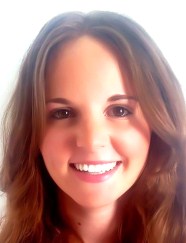 Courtney Lee, a Level H, BA Events and Leisure Marketing student has been appointed Social Media Manager for the Festival Impact Monitor.
Courtney Lee, a Level H, BA Events and Leisure Marketing student has been appointed Social Media Manager for the Festival Impact Monitor.
Courtney brings a great deal of experience to the role. During her placement she worked for the Hong Kong Tourism board, where she worked within the organisation’s Trade Development Team and also provided support with public relations. Courtney has already designed a comprehensive social media plan for the project which she will launch in early November. This includes the rechristening of the project as FestIM and the design of a logo. She will be accompanying the project’s Principal Investigator, Nigel Williams to key events and presentations to ensure that both the project’s live and virtual media are in sync and key messages are delivered across all the project’s media platforms.
Courtney is open to working with others interested in a social media role and would welcome enquiries from students wishing to be social media assistants. Interested students should e-mail nferdinand@bournemouth.ac.uk.
The Festival Impact Monitor is funded by the BU Fusion Investment Fund. For more click on this link.
The Centre for Social Work, Sociology and Social Policy cordially invites you to an afternoon seminar
‘The Global Agenda for Social Work: is it relevant to social work practice in England?’
Speaker: Dr David N Jones, Former President of the International Federation of Social Work (IFSW) and IFSW President’s Special Representative for the Global Agenda. Currently holding a post for PeopleNeedPeople. UK
Wednesday 23rd October
13.00-14.00
Executive Business Centre EB202
Biography:
Dr Jones has been at the centre of international social work developments for many years and is an acknowledged expert on the new trends and agendas that are shaping global social work. Known throughout the world for his passion for promoting civil society, we are very privileged to be able to host Dr Jones’ seminar at the Centre and would strongly encourage all members of staff and students with an interest in international social development and social work issues to attend what will be a most interesting and rewarding public seminar whatever your background (more…)
The Public Relations Research Group welcomed the leading Canadian practitioner, Fraser Likely, on Wednesday when he presented a lecture on communicating the value of PR departments to top management. It was attended by regional practitioners, students, academics, and Marketing & Communication staff.
Mr Likely, who is an adviser to Canadian banks, corporations and governmental bodies, emphasised the need for senior communication staff to understand their organisation fully, identify the elements of their department’s work that create value and operate in an entrepreneurial manner.
“This presentation was the first of several events in which academic research and practice issues are discussed with practitioners, students and fellow academics”, said Prof Tom Watson of The Media School. “On Wednesday, our speaker was an internationally highly-regarded practitioner and researcher. In others, BU academics will take recent research to practitioners at events in London and locally.”
The Public Relations Research Group is planning short seminars with the Chartered Institute of Public Relations in London and Wessex, as well as with Ketchum, a leading international PR consultancy group.
Simultaneously, the US-based Institute for Public Relations posted Fraser Likely and Tom Watson’s latest Research Conversations blog post on future trends in PR measurement and evaluation. It is based on a recent book chapter in a festschrift to the leading PR theorist, James E. Grunig: http://www.instituteforpr.org/2013/10/future-trends-in-measurement-and-evaluation/
Sascha-Dominik Bachmann, Associate Professor, Dep Law, EBC, addressed this year’s NATO JAPCC Joint Air & Space Power Conference 2013 – Air Power Post-Afghanistan.
JAPCC’s annual Conference provided a forum for critical discussion of themes arising from military Air Power and the ramifications of the anticipated 2014 cessation of NATO-led combat operations. The Conference was organized by the Joint Air Power Competence Centre and led by Air Marshal David Walker, RAF (http://www.japcc.de/fileadmin/user_upload/events/Conference/2013/2013-03-25-JAPCC_Conf_2013_Flyer_web.pdf).
Sascha reflected on the legal and moral issues arising from Targeted killing by drones (using Unmanned Aerial Vehicles (UAV) or Unmanned Combat Aircraft Systems (UCAS) as weapon platforms) which has become an increasingly debated subject. Criticism is not only directed against its overall legality and legitimacy, but also its negative impact on the theatre state as a sovereign state in cases of extraterritorial strikes, a potential lack of efficiency, and a growing uneasiness with its morality. It seems there has been a change in how targeted killing is viewed. Apart from a growing discomfort with civilian ‘collateral’ casualties, there is growing concern about its effectiveness and the acceptance of targeted killing as a new form of warfare. Ben Emmerson, the newly appointed UN Special Rapporteur on Human Rights and Counterterrorism, has called for more transparency and accountability when employing this form of warfare. – See more at: http://blog.oup.com/2013/06/drone-targeted-killings-pil/#sthash.Kky1JmWv.dpuf
We are delighted to launch the first edition of the Journal of Promotional Communication, an open-access; peer-reviewed, online journal edited by Corporate and Marketing Communications (CMC) academic group in the Media School, which publishes original research produced by undergraduate and postgraduate students. We welcome you to read the six papers selected for publication in the inaugural issue after a rigorous review process, and share them with your students, academic colleagues and practitioner contacts.
http://promotionalcommunications.org/index.php/pc/issue/view/3
Manuscripts published in Volume 1, Issue 1 of the Journal of Promotional Communication broadly speak to the theme of ‘People and Promotional Communication’, including an exciting mix of methodological and conceptual approaches which bring to the fore the humanness and everydayness in the production and consumption of promotional communications.
Our aim with this journal is to provide a platform for students from BU and other universities to publish work that demonstrates a critical understanding of their subject, whilst being creative, imaginative and interesting to read for academic and practitioner audiences alike. We are looking for examples of work which has the potential to challenge existing ideas and practices and seeks to inspire new ways of understanding and practising promotional communications.
The Journal of Promotional Communications is published two times per year (April, October) and the call is now open for papers for the next issue – deadline Friday March 7th, 2014. Submissions should be made online via http://promotionalcommunications.org/index.php/pc/about/submissions, where full ‘Author Instructions’ can also be found. If you have recently supervised work that you think should be considered for publication in the journal, why not encourage your students (UG, PG or PhD) to submit a manuscript for review? Diverse perspectives and approaches to the study of promotional communication are welcomed. Papers published in the Journal of Promotional Communication will draw on a variety of disciplinary areas covering, but not exclusive to, Marketing, Advertising and PR theory as well as Consumer Culture and Behaviour, Political Communications, Media Studies, Sociology, Cultural Studies and Management. From within BU, students submitting papers might come from a broad range of Academic Schools and subject areas; the Journal of Promotional Communication is not Media School exclusive!
We look forward to receiving submissions.
Dr Janice Denegri-Knott
Dr Carrie Hodges
Dr Dan Jackson
Dr Richard Scullion
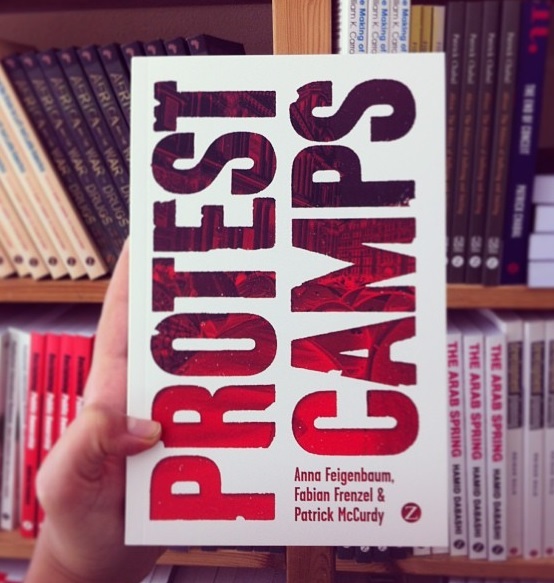 Protest Camps hits indie bookshops and digital shelves worldwide today. Co-authored by Bournemouth University’s Dr. Anna Feigenbaum, Fabian Frenzel (Leicester) and Patrick McCurdy (Ottawa), Protest Camps takes readers on a journey across different cultural, political and geographical landscapes of protest.
Protest Camps hits indie bookshops and digital shelves worldwide today. Co-authored by Bournemouth University’s Dr. Anna Feigenbaum, Fabian Frenzel (Leicester) and Patrick McCurdy (Ottawa), Protest Camps takes readers on a journey across different cultural, political and geographical landscapes of protest.
From Tahrir Square to Occupy, from the Red Shirts in Thailand to the Teachers in Oaxaca, Protest Camps covers over 50 different protest camps around the world over the past 50 years, offering a ground-breaking and detailed global investigation. Drawing on a wealth of original interview material, the authors argue that protest camps are unique spaces in which people enact new forms of democratic politics.
Protest Camps is now available at local booksellers and for online order in the UK. To find out more on the broader Protest Camps Research Network visit protestcamps.org and follow the project on twitter @protestcamps
“Feigenbaum, Frenzel and McCurdy’s wonderful book brings a fresh perspective to our understanding of contemporary political action … A fine achievement.”
– Professor Nick Couldry, London School of Economics and Political Science
“This book provides a captivating cartography that helps heal the chasm between how we live our everyday life and what our political ideas are, how we protest against the old world whilst proposing new ones.”
-John Jordan, co-founder of ‘Reclaim the Streets’ protest movement
To celebrate the launch of Protest Camps, the authors are participating in events across the UK and beyond:
October 19th – London Anarchist Bookfair, Queen Mary University of London
October 21st –The Organisation of the Organisationless – Talks in Digital Culture #1, King’s College London
October 26th – Edinburgh Independent Radical Book Fair 2013
October 29th –New Perspectives on Anarchism and Management, Centre for Philosophy and Political Economy at University of Leicester
October 30th –Protest Camps and Dissent PR Speaker Series at Bournemouth University
October 31st –Institute for Protest and Social Movement Studies at Technische Universitaet Berlin
November 2nd –ESRC Festival of Social Science event, Creating Worlds Together: A workshop on Experimentations and Protest Camps, Birkbeck, University of London
November 8th – tbc, Johannesburg, South Africa, Wits University
November 13th to 14th –PSA Media and Politics Group Conference, Bournemouth Univeristy
November 20th to 21st – Leicester, Generations of Protest Conference, DeMontford University
Here is the latest CEMP Research & Innovation bulletin. CEMP bulletin 10.10.13

New for this year:
(1) A more targeted approach to identifying funding opportunities;
(2) Funding calls aligned to research themes;
(3) If you would like to come and chat about anything in this bulletin, your own research or other projects / ideas that CEMP can help with, our monthly ‘CEMP Coffee Morning’ is at 9.30-10.30 on Thursday October 17th in the new CEMP office (CAG02).
The European Public Relations History Network (EPRHN), which has been supported in its formation by FIF, was launched at European Public Relations Education and Research Association (EUPRERA) Congress in Barcelona on October 3-5. The event, held on Friday October 4, was attended by 29 delegates from 12 countries.
“After more than a year’s planning, EPRHN is now in operation and has 50 active supporters from 18 countries across Europe”, said Prof Tom Watson of the Media School. “FIF has enabled it to get to the take-off stage and aided the very positive response found in Barcelona.”
Prof Watson also organised a panel session (the only one approved for the Congress) on developing the history of PR in Europe. It drew leading scholars from universities of Leipzig (Germany), Bucharest (Romania), Pompeu Fabra (Spain), as well as Prof Watson. It was chaired by the Italian practitioner/commentator Toni Muzi Falconi.
Refereed papers from Prof Watson and Drs Tasos Theofilou and Georgiana Grigore, also Media School, were presented at the Congress in well-attended sessions with several requests for copies of the papers afterwards, especially for the research on engaging employees with organisational Corporate Social Responsibility planning.